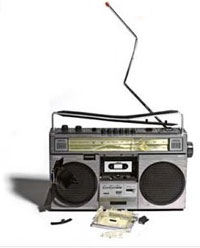The following anecdote won’t mean much to anyone who has never worked at a small town radio station covering local news stories. And I don’t share this to embarrass or disparage anyone still doing so. It’s just a sign of the times.
One of our network reporters called an affiliate in a small town, asking for a feed of a story about a bank robbery and the capture (and tasing) of the stickup guy. Our reporter was informed the station news person was on vacation and since they couldn’t find anyone to do the news in his absence, “they’re taking a break from the news this week.” Our reporter’s reaction?
“The bridge is too far away for me to walk to it and jump. Our bluffs are not high enough to guarantee a fatal descent if I were hurl myself off one of them and I do not want to spend years as a paraplegic watching for more of these signs. My Norelco razor will not cut through any arteries and the only scissors I am allowed to have are the school scissors my children left behind when they grew up.
My only recourse is to continue working in this industry until it reduces me to complete incoherence, upon which time I can be placed in a padded room where I shall be safe from the apocalypse.”
Philosopher and poet-journo Bob Priddy:
“Radio began to lose its soul when stations became “properties,” when communities became “markets,” and when staff became “human resources.”


 This is a short but sad story about a once-great radio station. Let’s call it KXXX. It was, for many years, “the voice of” the community. Had as many as four or five full time news people back in the day. This morning one of our reporters called the station regarding a pretty good story in their community.
This is a short but sad story about a once-great radio station. Let’s call it KXXX. It was, for many years, “the voice of” the community. Had as many as four or five full time news people back in the day. This morning one of our reporters called the station regarding a pretty good story in their community.